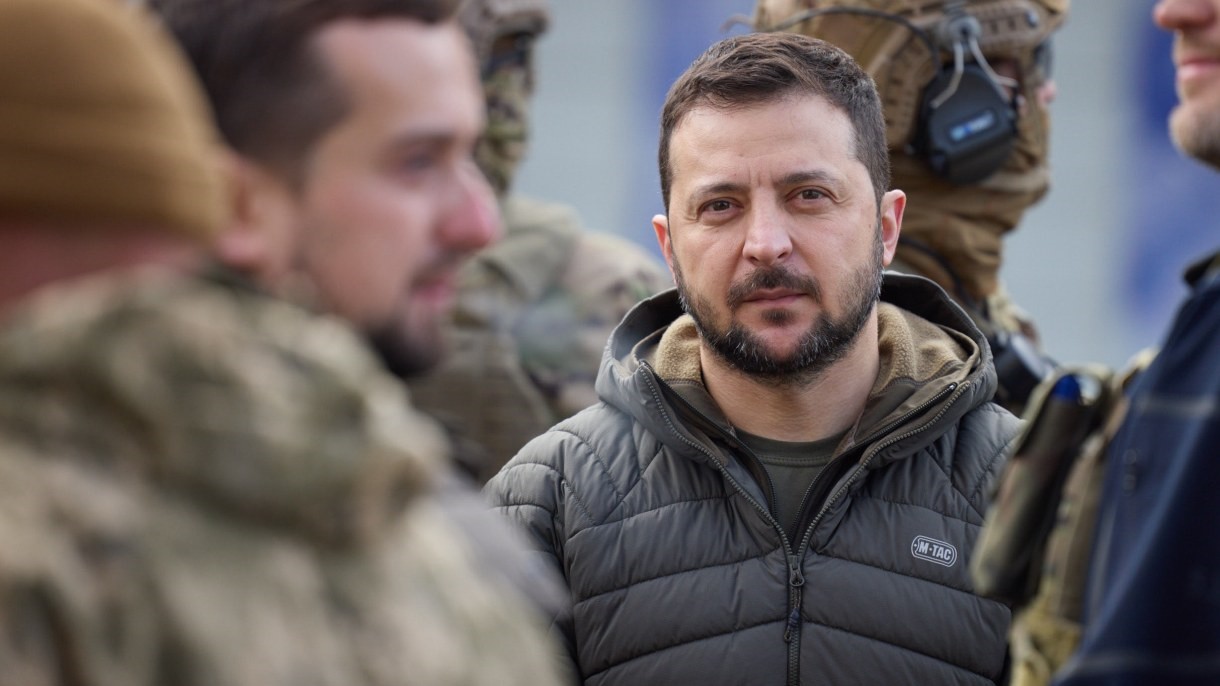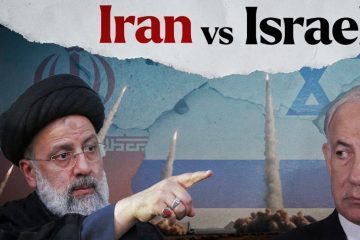Will the United States Leave Ukraine?

Putin staked his wager that Western nations, notably Europe, which relies so heavily on Russian energy, wouldn’t be able to resist his assault on Kyiv in February 2022 and would finally accept the disintegration or complete eradication of Ukraine.
After two years of fighting, Ukraine has shown to be a formidable opponent, reclaiming half of the territory that Russia had seized and causing unbelievable losses to Russia’s significantly stronger force. Europe has also increased military spending and promises to Ukraine after enduring the economic impact of cutting off Russian natural gas supply. Over Hungary’s objections, the European Union approved a new $54 billion aid package for Kyiv last month.
Moscow has effectively inserted itself into America’s culture warfare, thus it seems like Putin’s bet is paying well in the US for the time being.
The United States’ support for Ukraine, which was formerly seen as an obvious national interest, has now become a contentious political issue in this election year. Some Republicans on the right have started to praise Putin and even the metro systems in Moscow and Russian supermarkets, while criticizing the government and army of Ukraine, which is currently facing many challenges.
The most recent bipartisan measure, which was approved by the Senate 70–29, would authorize further military aid to Ukraine. However, the Republican leadership of the House of Representatives has been stalling this legislation for months. Ukrainian soldiers are already severely short on artillery ammunition because to the shutdown that ensued. Russian forces were able to take the Ukrainian city of Avdiivka this month—the first significant tactical breakthrough for Moscow since May—because of this, according to President Biden and Ukrainian commanders.
Ukraine is in a particularly precarious position due to the abruptness of the shutdown, which followed months of bipartisan promises that American arms would continue to flow somehow or another. Thanks to North Korea’s large artillery shell and ballistic missile shipments, Russia has regrouped and is pushing a new attack throughout the whole front line of the war.
It’s not enough that we were not given advance notice or an opportunity to adapt; American aid has been abruptly removed. Russia could gain the upper hand if Ukraine doesn’t have the means to defend itself, according to Andriy Zagorodnyuk, a former Ukrainian military minister who advises President Volodymyr Zelensky’s administration. “Putin will receive a huge gift if this crisis is not resolved and Ukraine does not receive the assistance.”
A growing number of democracies across the world are becoming uneasy at the thought of an outmatched Ukraine losing even more ground in the next months, on top of new uncertainties over America’s dedication to defend its friends in the event that Donald Trump is reelected to the presidency in 2017. Considering Putin’s increasing ties to autocratic China and his de facto military alliance with Iran and North Korea, this is particularly true.
In the democratic island nation of Taiwan, which Beijing labels a “renegade province” and which has vowed to “reunify” with the mainland, tensions are running high. According to Wang Ting-yu, who is expected to take over as head of the military and international affairs committee in Taiwan’s parliament, “is going to be a disaster and is going to encourage the dictators in Beijing, in North Korea and in other countries” if the United States withdraws from Ukraine. They will see that the world leader can’t be patient enough to back its friends. Decisions and assessments will be faulty if they hold that mindset.
The Biden administration and a number of prominent Republicans, such as Senate Minority Leader Mitch McConnell—who was instrumental in negotiating and passing the bipartisan measure that would grant $95 billion in assistance to Taiwan, Israel, and Ukraine—share that concern. As the head of the free world, the United States of America shares the view of every other democracie that this is crucial. “We cannot back away,” Senator McConnell stated in an interview regarding the assistance to Ukraine. I don’t think it’s appropriate to imply that we aren’t capable of handling this at this moment. The majority of that money, he said, will go back into the economy and help build jobs in American businesses.
Even while over half of Western backing for Ukraine comes from partners in Europe, the United States is the only country with the arsenal of weapons that can provide immediate support to Ukrainian forces, including air-defense interceptors and ammunition. Military experts predict that the Ukrainian military will run out of ammunition in 2025 or later, despite the fact that manufacturing in Europe is on the rise. Certain vital military hardware can only be procured from American warehouses.
A deciding element on the battlefield, the potential cessation of American supplies has been reassured to Ukrainian officials by the Biden administration and party leaders in Congress that it will never happen. Rep. Mike Johnson (R-OK) made comparable claims upon becoming House speaker in October. During an interview with Fox TV, he stated, “We can’t allow Vladimir Putin to prevail in Ukraine, because I don’t believe it would stop there.” “They deserve our undivided attention.
Johnson has now refused to allow a vote on the most recent bill from the Senate, citing other priorities, despite the fact that it would most certainly obtain a resounding majority in the House. The current situation makes it seem as though no further funds for Ukraine will be authorized by the present Congress at all, and it is highly improbable that the House would even discuss Ukraine aid until at least mid-March.
Naturally, the possibility of Trump’s November election victory looms large over the legislative debate. The ex-president has promised time and again that he will end the Ukrainian conflict quickly, but he has never specified when or how this will happen. During a recent campaign event, he further criticized NATO, saying that he would not stand behind member states who do not invest 2% of GDP on defense. Reportedly telling a European leader, “In fact, I would encourage [Russia] to do whatever the hell they want,” Trump made the statement.
Sen. McConnell cited the effect of Trump and the long-standing isolationist sentiment in American politics, especially before WWII, as reasons why a large number of Republicans are now against providing funding to Ukraine. “Our probable presidential candidate is not enthusiastic about assisting Ukraine,” McConnell stated.
There is little hope for peace talks with Russia or a settlement being reached before the November U.S. presidential elections, according to officials in both Washington and European capitals. Despite Ukraine’s claims that it will not rest until it reclaims all 18% of its internationally recognized territory that is under Russian control, Moscow has not abandoned its original war goal of annexing all of Ukraine.
Russian President Vladimir Putin spent thirty minutes this month arguing that western Lviv and the rest of Ukraine is historically Russian territory and that the Ukrainian nation was a creation of the Austrian military in the years leading up to World War I. The conversation aired on Tucker Carlson’s talk show. According to Dmitry Medvedev, a former president of Russia, Ukraine is a “cancer” and any independent Ukrainian state—regardless of how sympathetic it is toward Russia—will be destroyed in the end, whether it’s in ten or fifty years.
Kiev poses a “fatal threat” to the Ukrainian people, according to Medvedev, leader of Russia’s conservative party. Life in a large common state, which they despise at the moment, will seem better than death to them when they reach that realization. Loss of life, both their own and those they care about. The sooner the Ukrainians understand this, the better.
In response to Moscow’s newfound confidence, American friends in Europe and Asia have issued a flurry of warnings about the possible domino effect of giving Russia the victory in Ukraine. Since the Western allies have spent hundreds of billions of dollars on Ukraine and have repeatedly publicly promised to stand behind them “for as long as it takes,” the stakes are significantly higher now than they were at the beginning of the war two years ago.
“The level of U.S. investment in the project of Ukraine’s independence has increased, and therefore [so has] the extent to which U.S. credibility is judged based on Russia’s ability to accomplish or not accomplish its objectives in Ukraine,” added Samuel Charap, a senior political scientist at the think tank RAND who has previously advised caution over Ukraine. “The rising pseudo-bloc of Russia, China, North Korea, and Iran would gain a lot of credibility if the situation in Ukraine were to drastically reverse.”
Many Trump backers who are against providing additional aid to Ukraine justify their stance by saying that we must instead concentrate on China, a far more formidable adversary than Russia. They minimize the impact on Asian security of a U.S. withdrawal from Europe, even if their Asian friends have warned them otherwise. But it seems like Americans care about Asia and Europe equally. Just slightly fewer than three quarters of Americans(74%) think that the conflict in Ukraine is critical to American national interests, as do 75% of Americans regarding the escalating tensions between China and Taiwan (75%).
U.S. policy should center on East Asia. At last week’s Munich Security Conference, Republican Senator J.D. Vance of Ohio stated that this will constitute American foreign policy for the next four decades, and he urged Europe to recognize this reality. Vance did not attend a meeting between legislative delegations and Zelensky. The European Union has failed to take the lead in its own security, which is why it is unable to serve as an adequate deterrent. European security has been permitted to atrophy by the American security blanket, in my opinion,” he added.
Elbridge Colby, a prominent Republican strategist and former Trump administration deputy assistant secretary of defense, claimed that the urgent need to pivot to Asia is heightened by the link between Russia, North Korea, Iran, and China. Because they are likely to work together, challenge us, and divert our attention, the significance of prioritizing grows, not shrinks. We may anticipate that alliance to divert our attention away from the decisive theater, which is taking place, because China is the leading participant in it, he added.
He went on to say that the United States has less foreign policy alternatives due to the dwindling strength of its industrial base and its slowness in restocking the weaponry it had sold to Ukraine. Operating in a state of scarcity is essential, much like an overworked business. The world we live in now is full with poor decisions, Colby said. “The Europeans failed to step up, and it’s our fault that we kept thinking—along with the president and a few senior Republicans—that we could handle everything.”
With their recent approval of further funds for Ukraine and expansion of munitions production, Europe is clearly taking the lead. A number of European countries have recently inked defense cooperation agreements with Ukraine, including Germany, France, and the UK. In Lower Saxony, Chancellor Olaf Scholz of Germany and Prime Minister Mette Frederiksen of Denmark broke ground this month on a new ammunition mill with the capacity to manufacture 200,000 artillery shells per annum.
Last year, the European Union promised to provide one million shells to Ukraine, but they only managed to deliver approximately one third of that quantity. The United States thinks that Russia has received almost one million shells from North Korea as a whole.
According to Berlin-based researcher Thorsten Benner of the Global Public Policy Institute, several European countries, like Poland and the Baltic states, have considerably above NATO’s 2% limit for military expenditure. “However, it will be insufficient unless other European countries, including Germany, France, and many others, take action,” he stated.
In light of the United States’ possible withdrawal from Ukraine and other European obligations, Benner said that the growing discussion in Germany over the possibility of expanding the nuclear umbrella of France and Britain to their European allies demonstrates how terrified Europeans have grown. “It reveals the extent to which we are uncertain and terrified of the future we are entering—a future in which the United States may not support us and in which the two hostile superpowers, Russia and China, may band together to oppose us.”
Despite its recent successes in Avdiivka, the Russian military is fatigued and outmatched in terms of production and repair capabilities; it is losing more tanks, howitzers, and other military equipment to Ukrainian forces. Despite the fact that the advantageous ratio is slowly decreasing due to ammunition rationing, attrition is still working in favor of Ukraine at the moment, according to Franz-Stefan Gady, an adjunct senior fellow at the Center for a New American Security who has been to the front lines of the conflict on multiple occasions. According to him, as long as Western aid keeps flowing, Ukrainian forces should be able to restart offensive operations after this attrition phase.
What Gady meant was that the Russian army could be defeated. “However, a growing awareness is emerging in Europe regarding the potential negative outcomes, which, if realized, will profoundly impact the continent’s security architecture.”
According to Camille Grand, who was an assistant secretary-general of NATO until 2022 and is now a fellow at the European Council on Foreign Relations, European nations have begun to take the possibility that Russia would be tempted to test the defenses of current NATO and EU members if it defeats Ukraine more seriously in recent months.
Russian aspirations extend beyond the post-Soviet space, a newfound realization has emerged, he added. “Ukraine’s future isn’t the only thing at stake in this conflict.”










